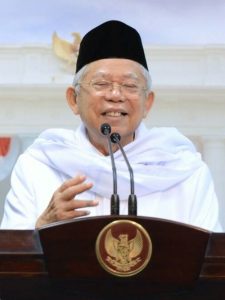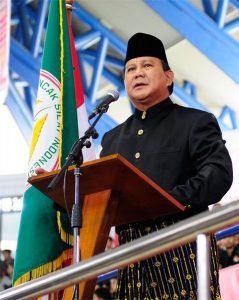Are there any Australians left ignorant of Judge Brett Kavanagh and his successful scramble for a US Supreme Court seat? Or research psychologist Dr Christine Blasey Ford, his accuser of sexual assault at a last century teenage party?
But who knows of Ustadz Haji Ma’ruf Amin, 75, seeking to be a heartbeat from Indonesia’s top job? Two years ago the Muslim scholar urged on half a million protestors howling for Jakarta governor Basuki ‘Ahok’ Tjahaja Purnama to be jailed for blasphemy. Ahok’s a Christian, an ethnic Chinese, and still behind bars.
Amin has the supporting role to current president Joko ‘Jokowi’ Widodo, 57, in his bid for a second five-year term. If the preacher becomes vice-president and his hard-line policies get a grip, they’ll crush the world’s most populous Islamic nation’s reputation for religious tolerance.

Or for those who like their politics lite and frothy, how about actress Ratna Sarumpaet who falsely accused Jokowi-Amin backers of a bashing, when her bandages were masking elective plastic surgery? She was yanked off an international flight and faces charges; the case is gripping the world’s third largest democracy.
Both the Washington and Jakarta tales are grand soapies (sinetron in Indonesia) with lashings of sleaze. The first has been forensically reported in the Australian media; even the ABC’s standout talk show Q & A spent valuable time on an issue of little importance Down Under.
But apart from Lombok and Central Sulawesi disaster stories, coverage of events next door in Indonesia has been scant.
“The imbalance in reporting by the Australian media on issues about Indonesia are indicative of the ignorance and ambivalence that defines the bilateral relationship,” according to Perth-based Indonesia Institute President Ross Taylor.
“An accident in Bali resulting in a young and drunk Australian hurt from a fall from a motorbike will attract media attention,” he told Asian Currents.
“Yet Indonesia’s critical presidential election in 2019 and its transition to a far more conservative Islamic society where minority groups are victimised, hardly gets a mention despite the profound implications for Australia”.
The result of the Indonesian campaign now rumbling towards the April poll could thump Australia’s future, knocking trade, defence, security – even holidays. Among other policies, Amin wants homosexuality and adultery criminalised, so couples heading to Bali might have to pack their marriage certificates.
Should Jokowi’s rival, disgraced former general Prabowo Subianto, 67, win and turn the Republic back to the dictatorship and kleptocracy of second president Suharto, the fragile relationship with Australia could collapse. Subianto was once Suharto’s son-in-law.

Either way Australia will be affected far more than the inauguration circus of a new judge in the US.
The Indonesian election should be given a great deal of careful attention in Australia, Director of Melbourne University’s Centre for Indonesian Law, Islam and Society.
“The young Indonesians who will be voting in April in larger numbers than ever since 1999 have grown up in the post-Reformasi environment of clunky and increasingly illiberal procedural democracy, amid contests over Islamisation and amid the rise of the hardliners,” he said.
“While they are savvy and highly connected, maybe even more so than their Australian contemporaries, they are also surprisingly conservative.
“This conservatism, driven by increasing Muslim populist intolerance, has led to a situation where the differences between Jokowi and Prabowo are nowhere near as clear as they were at the 2014 election.”
Last year Australian Associated Press closed its Jakarta bureau after 35 years in the country. While Fairfax and the Murdoch media retain offices their staff are now labelled ‘Southeast Asia Correspondents’ when they were previously ‘Indonesian correspondents’.
The ABC is an exception, keeping its Jakarta office and covering Indonesian affairs through its Asia Pacific Newsroom in Melbourne. Reuters and other overseas agencies in Indonesia produce copy along with correspondents and contributors; some stories are available here, but few have an Australian perspective.
Getting news out of the US is easy for the Australian media. There’s an abundance of sources and no translations required. Much is cut and paste plus metrication and spelling rejigs.
Australia is moving even further from creating widespread familiarity with Indonesia, according to former diplomat and author Ken Ward who worked as Senior Indonesia Analyst at the Office of National Assessments.
“(Donald)Trump’s election has resulted in a deplorable reorientation of the Australian media towards US reporting,” he said. “This seems to be a mirroring of the US media’s obsession with Trump himself.
“It is as if everything important to Australia takes place in the US. This is not the result of the effective workings of US soft power or political pressure but of a complete lack of imagination on the part of Australians.”
Going to the fount
Australians frustrated with their media can access a few Indonesian sites on-line.
Indonesia has the most liberal media in Asia, though much is partisan with the major free-to-air TV stations owned by moguls wading deep in politics.
There are two English language papers. The Jakarta Post, has some stories behind a paywall. Founded in 1983 it’s historically linked to the broadsheet Kompas, the Republic’s top selling and most credible daily.
The Jakarta Globe started in print in 2008 but is now on-line only. It’s owned by the Lippo Group led by evangelical Christian James Riady.
The prestigious weekly news magazine Tempo is among the best for analysis. It produces print and web editions in English.
Metro TV, the most serious commercial network focusing on news and current affairs has some reports in English. It’s owned by Surya Paloh who also holds the daily newspaper Media Indonesia. Paloh chairs the Nasdem (National Democratic) party hostile to Subianto.
TV One belongs to the Bakrie conglomerate formerly chaired by Aburizal Bakrie who’s prominent in Golkar. The party now appears to be with Widodo-Amin, though political alliances are often fragile. He was a minister in the previous administration of sixth president Susilo Bambang Yudhoyono.
For 27 years the government station TVRI was the only channel that Indonesians could watch. It claims to have an English language service but much is in Indonesian.
The Indonesian news agency Antara (Between) has copy in stilted English. It’s supposed to be a private company but comes under the Ministry of State-Owned Enterprises. Its boss, former The Jakarta Post editor-in-chief Meidyatama (Dimas) Suryodiningrat, was reportedly hand-picked by President Widodo to run the service.
Featured image: Poster at construction site, taken by author.

